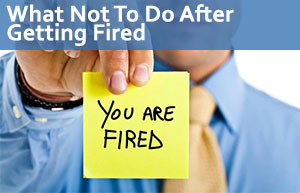HABLE CON UN ABOGADO HOY
Abogado de despido injustificado: ¿tengo un caso?
As an employment law firm specializing in wrongful termination cases, we frequently receive questions about illegal firings. Some common concerns include:
Losing a job can be a life-altering experience, causing stress due to the sudden loss of income that covers food, rent/mortgage, loans, and family expenses.
Although California is an “at-will” state, meaning employers can terminate employees for any reason or no reason at all, the dismissal must still comply with federal, state, and local laws. If an employer fires an employee for reasons that violate any of these laws, it is considered wrongful termination.
If you suspect your firing was wrongful, you may have the right to file a lawsuit. Here’s what you need to know about wrongful termination.
Si su abogado no maximiza el valor de su caso, comuníquese con nuestra firma para obtener una segunda opinión gratuita.
¿Fue mi despido ilegal?

Breach of Contract
If your employment contract outlines specific promises regarding job security, termination conditions, or growth opportunities, your employer may have violated that agreement. A contract that states you can only be terminated for “good cause” strengthens your case against an at-will employment defense.
Implied Promises
Even if you never signed a written contract, an implied employment contract may exist based on verbal statements, company policies, or past employment practices. Courts evaluate several factors to determine whether an implied contract was breached, such as:
- Length of employment
- Consistent positive performance reviews
- Verbal assurances of continued employment
- Employer’s deviation from usual termination practices
- Promises of long-term job security
Infracciones del trato justo
Employers have a duty to act in good faith and deal fairly with employees. Violations may include:
- Firing employees to avoid paying commissions or benefits
- Misleading employees about salary increases or promotions
- Fabricating reasons for termination to replace employees with lower-paid workers
- Transferring employees to undesirable positions to force resignation
- Failing to disclose job risks, such as dangerous work conditions
Rompiendo la política pública
Employers cannot fire employees for reasons that violate public policy. Wrongful termination lawsuits may arise when an employee is fired for:
- Filing discrimination or harassment complaints
- Taking jury duty leave
- Voting in elections
- Sirviendo en el ejército
- Exercising a legally protected right
Discrimination
Employers cannot terminate employees based on legally protected characteristics, including:
- Pregnancy
- Race
- Disability
- Age
- Gender
- Sexual orientation
If your termination involved discrimination, our wrongful termination attorneys can take legal action against your employer.
Retaliation
Employers cannot retaliate against employees for engaging in legally protected activities. Wrongful termination due to retaliation includes firing employees for:
- Reporting workplace harassment
- Filing HR complaints
- Complaining about unpaid overtime or wage violations
- Reporting unsafe working conditions
- Blowing the whistle on illegal business practices
Whistleblower Protection
Employees who report illegal business activities, regulatory violations, or public safety concerns are protected under whistleblower laws. Employers who terminate whistleblowers can be held accountable under state and federal laws.
Can I Sue My Former Employer?
Before filing a wrongful termination lawsuit, you must first submit a claim with the Equal Employment Opportunity Commission (EEOC) or the California Department of Fair Employment and Housing (DFEH). Depending on the nature of your case, strict filing deadlines (statutes of limitations) apply:
- Discrimination, retaliation, or harassment cases: 12 months to file.
- EEOC right-to-sue letter: 90-300 days to sue after receiving the letter.
- Termination violating public policy: 2 years to file.
- Breach of contract claims: 2 years for oral contracts, 4 years for written contracts.
¿Tengo un caso de despido injustificado?
Determining whether you have a valid wrongful termination case requires an experienced employment attorney. At the California Labor Law Employment Attorneys Group, we offer:
- Free consultation: We will evaluate your case and provide guidance.
- Zero fee guarantee: You pay nothing unless we win your case.
Consulta gratuita y garantía de tarifa cero
Our employment lawyers are experienced in handling wrongful termination cases across California. The California Employment Attorneys Group operates on a contingency fee basis—no upfront fees, and we only get paid if we win your case.
Revisión del cliente
“I am so grateful to have found the California Labor Law Employment Attorneys Group. Igor provided the best possible outcome for my termination agreement. Every point he recommended was granted. I can’t say enough about how he looked out for all my interests with professionalism and care.”
– Tiffany Reynolds
Revisión del cliente
“Estoy muy agradecido de haber fundado el Grupo de Abogados de Empleo en Derecho Laboral de California. El consejo de Igor me permitió lograr el mejor resultado posible con mi acuerdo de rescisión. Cada punto que recomendó fue concedido. No podría haber pedido más. Igor fue el segundo abogado laboral con el que trabajé durante este momento tan estresante y lo único que lamento es no haberlo encontrado primero. No puedo decir lo suficiente sobre cómo se ocupó de todos mis intereses, sus sólidos consejos profesionales y una manera positiva muy afectuosa y edificante”.
-Tiffany Reynolds

100% CONSULTA GRATUITA DE CASO

Nuestra garantia
NO pague HONORARIOS hasta que ganemos su caso de empleo.

Revisión del cliente
Grupo de Abogados de Empleo en Derecho Laboral de California
5 de 5
Éste puede ser un mundo feo y es agradable saber que abogados como Daniel ayudan a las personas a corregir un error cuando han sufrido a manos de su empleador. Daniel es uno de los buenos que existen y recomiendo encarecidamente sus habilidades como abogado laboral.
– Hoagland Stubbs